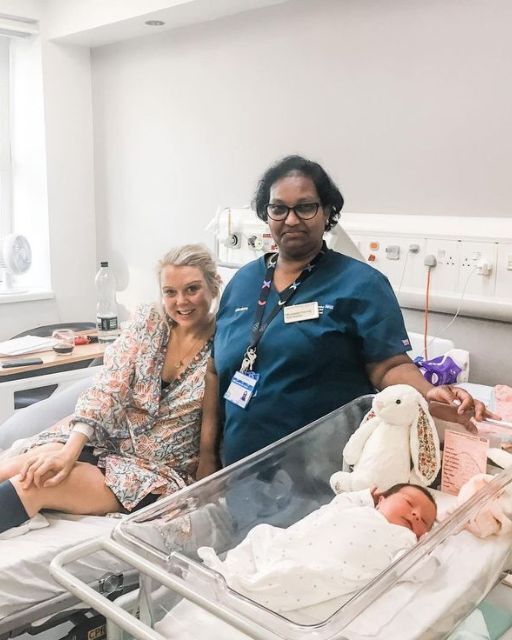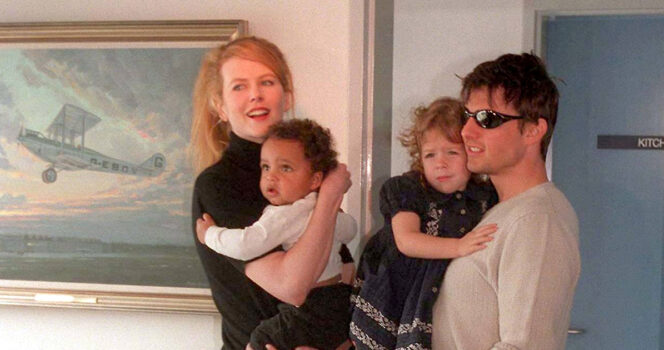I never imagined I’d become the mother-in-law left sitting in the hospital lobby while everyone else was upstairs meeting the baby. But that’s exactly where I found myself—alone in a stiff vinyl chair, holding a pastel gift bag that suddenly felt silly and out of place. I waited there for nearly two hours, watching strangers ride the elevator with flowers, balloons, and eager smiles while my own heart twisted in confusion.

My son Elias and his wife Maren had just welcomed their first child—a beautiful baby girl. I was overwhelmed with happiness. I had skipped a major work event, spent weeks crocheting a soft baby blanket, and bought them the baby swing they’d added to their registry. When Elias texted me at 5 a.m. saying, “She’s here. Everyone’s doing well,” along with a photo of the baby wrapped in that familiar striped hospital blanket, I cried into my lukewarm coffee, smiling through tears. I asked when I could visit, and Elias replied, “We’ll let you know when we’re ready for visitors. Probably late morning.” So I waited. I made more coffee, double-checked the bag, and by 10:45, I figured I’d quietly wait in the hospital lobby—just in case. I didn’t want to be pushy.
But when I got there, I watched Maren’s sister and her husband get waved upstairs. Her parents were already there. No one stopped them, and the nurses greeted them warmly. I sent Elias a message: “Hey, I’m downstairs. Should I come up?” No reply. Then Maren’s best friend arrived with balloons and a camera. She gave the nurse a name, smiled, and was ushered right upstairs too. Still no word from Elias. I felt invisible. My joy turned into sadness. I was about to leave, my heart heavy with rejection, when the elevator doors opened and Elias stepped out. He looked tired, eyes rimmed red, and he walked straight over holding something in his hand. “Mom, can we talk?” His voice wasn’t harsh—it was soft, weighed down by exhaustion and emotion.
We stepped into a quiet corner by the vending machines. “Maren’s having a tough time,” he began. “Physically she’s okay, but emotionally… she’s struggling. She hasn’t bonded with the baby yet. She keeps asking if she’s enough, if the baby will love her. She’s scared. And now she doesn’t want anyone visiting unless she feels safe—safe from judgment.” My heart dropped. “So… she doesn’t want me to come up?” I asked gently. “It’s not you,” Elias said quickly. “She just… she sees how together you always are, how capable, how confident. And she’s afraid you’ll think less of her if she’s falling apart.” His words stung, but I understood. I hadn’t meant to make her feel inadequate—but maybe without realizing it, I had. “Elias,” I said quietly, “I don’t care how messy things are.
I just want to see my granddaughter and tell Maren she’s doing better than she thinks. Nobody’s perfect. Especially not on day one.” He nodded, grateful. “I believe you. And Maren will too—in time. She actually said that when she’s ready, she wants you to be the first person to meet the baby.” I could’ve insisted, pushed my way upstairs, but I looked into my son’s pleading eyes and chose something else. I hugged him tightly and said, “Tell her I’m here. When she’s ready, I’ll be waiting—with nothing but love.” In the days that followed, I stayed away from the hospital, even though everything in me wanted to go back. Instead, I helped in other ways—dropping off meals, straightening up the nursery, leaving handwritten notes around their apartment. Each note ended the same way: You’re amazing parents. Take your time. Then, a week later, Maren texted: “Can you come by tomorrow afternoon? We’d love for you to meet Willow.” Just reading her name brought tears to my eyes. When I arrived, the house smelled like lavender and fresh laundry. Maren looked tired but beautiful. She gave me a soft hug and led me to the baby, who lay sleeping in the blanket I’d made. “She likes you,” Maren said, watching as Willow curled her tiny fingers around mine. “I was scared you’d be disappointed in me.” I turned to her and said, “Why would I be disappointed? You’re exhausted. You forget to eat. You cry a lot. That’s called being a mother.” I placed my hand on hers and continued, “None of us know what we’re doing. We just keep showing up. That’s strength.” Maren smiled then—truly smiled—and from that moment, something changed between us. She began asking for advice, and I shared stories of my own chaos and grace. We bonded, not through perfection, but through shared vulnerability. One night, as we watched Willow sleep, she whispered, “Thank you. For waiting. I know it couldn’t have been easy.” I nodded. “It wasn’t. But it was worth it. Because now, I get to see how strong you are. You’re an incredible mom, Maren.” She hugged me tightly, and I realized that love isn’t about being first through the door—it’s about knowing when to step back so someone else can step into their strength. If this story resonates with you, share it with someone who needs to know that patience, grace, and quiet love go a long way—and that sometimes, love is waiting quietly in the hallway.





